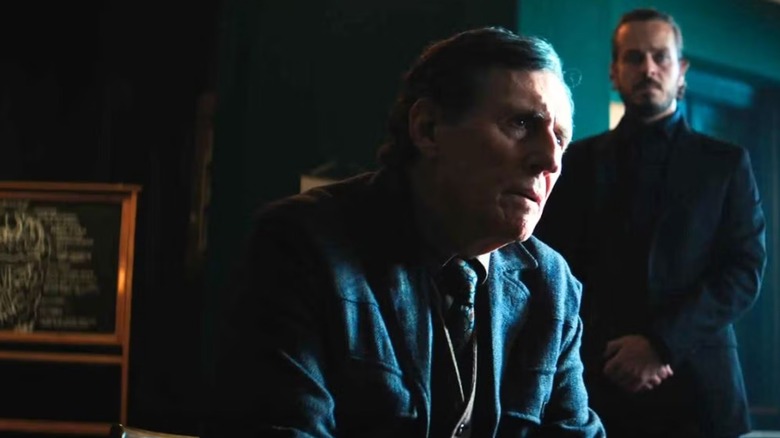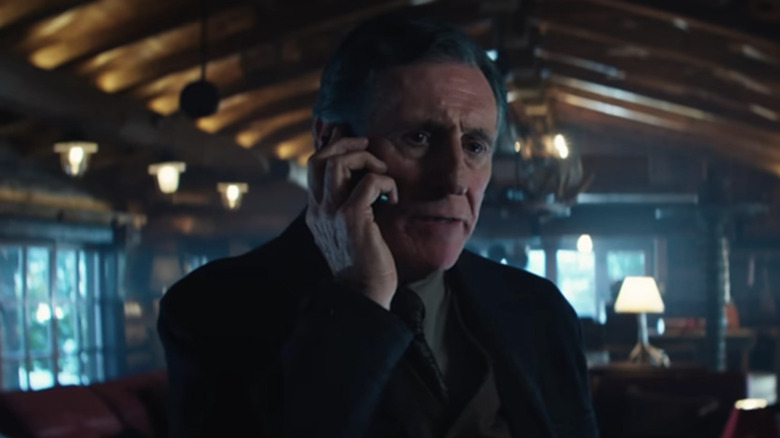Ballerina's Villains Are Unlike Anything Seen In The John Wick Universe
Warning! Spoilers for "Ballerina" follow.
The villains of the "John Wick" films are largely incidental. They can be effective challenges for Mr. Wick (Keanu Reeves), but no one goes to these movies for the bad guys. We go to see John blow them away. Does the new spin-off "Ballerina" change that?
The primary villain of "Ballerina" is a man called the Chancellor (Gabriel Byrne, always a welcome sight in any movie). True to his title, the Chancellor leads a community of assassins based in the Austrian mountains. Eve's (Ana de Armas) late mother was a member of the Chancellor's community but tried to leave with her husband, Javier (David Castañeda). The Chancellor came to retrieve Eve and murdered Javier, but Eve escaped to be raised by the Ruska Roma mafia.
Our Ballerina now wants revenge on the man who murdered her father. It's a tale as old as time — definitely much more old hat than tearing through the New York mob because one of them killed your dog. In the first "John Wick," the villains are simple Russian mobsters. To keep the story going, John Wick Chapters 2-4" escalated. The first film introduced the nifty idea of the Continental hotel, which caters to assassins by forbidding any bloody "business" on its grounds. The sequels built on that idea to introduce a new mythology about The High Table, a council that governs the world of assassins.
The Chancellor does not sit on the High Table. He and his people are described as a cult, one with a long history that doesn't even try to hide their barbarity behind a system of rules. Now, the cult is part of the same underworld that the past "Wick" movie explored. They have a truce with the Ruska Roma (that, in the third act of "Ballerina," John is called into enforce against Eve) and cult members are plugged into the same system that High Table assassins are; note how the Chancellor's men get the same notifications about assassination contracts on their phones that High Table killers do. However, the cult does not submit to the High Table's authority, and is allowed to exist because they're too fearsome to destroy.
There's a joke that the "John Wick" sequels make it seem like everyone in New York City is an assassin. In "Ballerina," the cult owns an entire town (shot in the real Austrian town of Hallstatt); everyone living in the town is an assassin ready to pull a gun on Eve at a moment's notice. The setting of a snowy, rural European village is also a new setting for John Wick-style action; Eve doesn't settle for mere guns, but takes a flamethrower to the village.
What do the cult villains of Ballerina want?
/Film's Ben Pearson spoke with "Ballerina" director Len Wiseman, who described the Chancellor's tribe as "almost as if David Koresh was running an assassin congregation." Wiseman detailed where that idea came from:
"Their code is different. That fascinated me. I come from a religious background, and if my family's [reading], it just wasn't for me. But there's elements of ... it's treated more like a religion than it is an assassin tribe. And so, not to say that I grew up in a cult, but there's a cult aspect to it.
Again, the atmosphere of the cult's village in "Ballerina" makes for a great action scene setting. But if you're expecting "John Wick" plus "The Wicker Man" from this, temper your expectations. The movie skimps on actual details of the cult's doctrine. We know they have no compunctions about violence and that once you join, membership is for life. The Chancellor's son, Daniel Pine (Norman Reedus), tries to escape with his daughter, Ella (Ava McCarthy). The Chancellor orders his son killed and his granddaughter returned so that she might learn to take up his role one day. But that's about all we learn.
What does the cult believe in, specifically, and why? What rituals do they practice? When and how did they come together? If you're going to describe the villains as a cult, then you need to explain a bit about the dogma that binds them together. "Ballerina" doesn't bother. Change the Chancellor into another crime boss, and nothing about the movie would change. Byrne is far from bad, but even he can only do so much with paper-thin material.
The "John Wick" movies have often been praised for their world-building. It sometimes feels, though, like that praise comes from the low bar of our expectations. An action movie with a story? That's not based on pre-existing source material? A professor of mine once described the writing of "John Wick" as like when kids are on the playground and keep making up new rules to a game on the fly, and well, yeah.
The last attempt to flesh out the "John Wick" universe — "The Continental" TV series — was so panned that even "John Wick" director Chad Stahelski thinks it went wrong. "Ballerina" is better, but that rests on the strength of its action and de Armas' star power, not how it builds out the "John Wick" cinematic universe.
"Ballerina" is currently playing in theaters.

